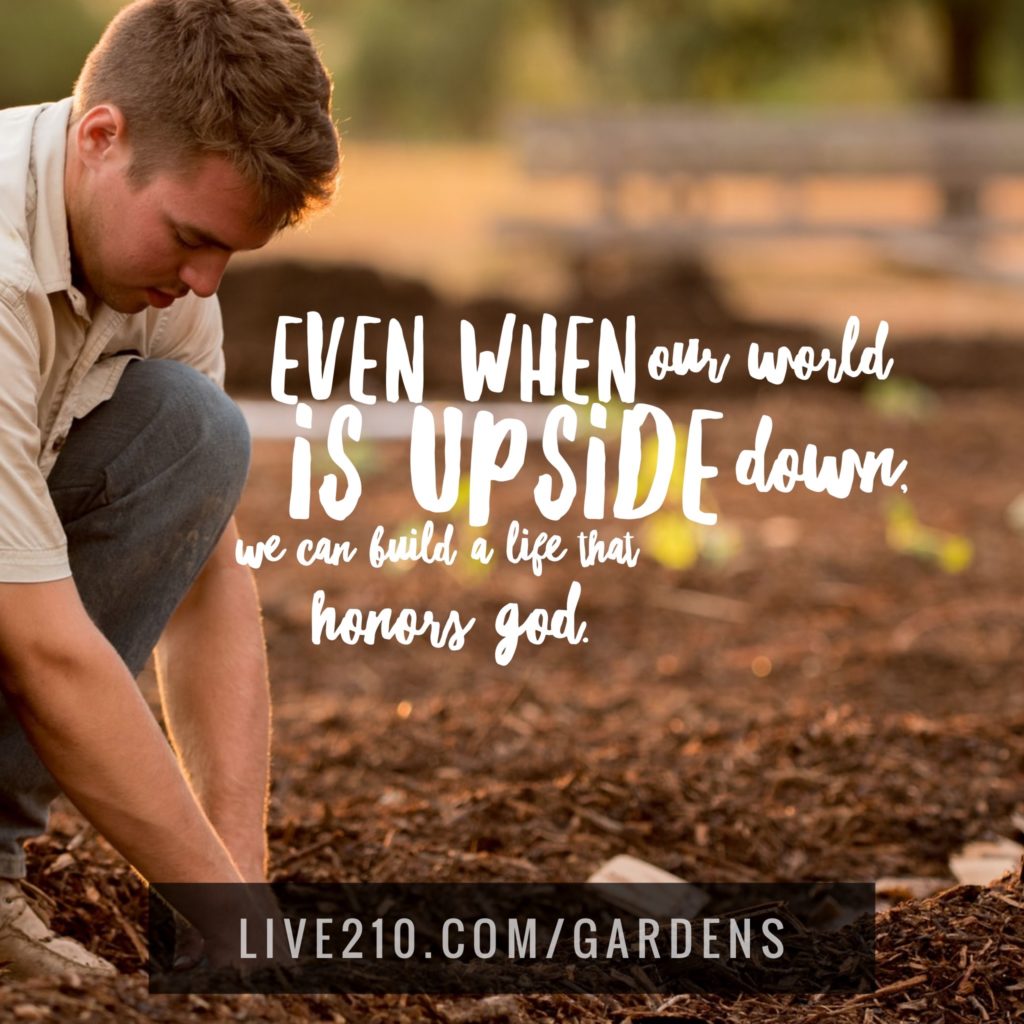7 min. to read.
The circumstances we find ourselves in are not what we would have chosen.
COVID is still killing more than a thousand people in the U.S. each day, and there seems to be no coherent plan on the horizon to address this. Protests against police brutality have continued—in Portland, we’ve passed 130 consecutive days—and yet there seems to be no outcome other than more police brutality. We’re only weeks away from the U.S. election, and the vitriol is so deep there is a serious question about whether there will be violence.
Events throw our lives into fear and uncertainty. There seems to be no end in sight. How are we to make a life in the middle of this turbulence? How are we, as followers of Jesus, to be light and salt in this situation?
In my last post (Are we listening to false prophets?) I shared a scene from Hebrew scripture. This passage from the book of Jeremiah portrays a conflict between prophets in a situation of unrest. In moments of fear and uncertainty, like we’re living through now, we run the risk of listening to the wrong prophets. We want to listen to the people who affirm what we already believe and who promise us a quick path out of discomfort. But that is rarely good for us, and often it means we miss what God is saying.
Hananiah was the prophet who preached that everything would go back to normal in just a short time. He was wrong. Jeremiah preached that hard times were coming and that people needed to prepare. When the final devastation of Judah and Jerusalem came at the hands of the Babylonian armies, he was proved right. With their lives upended, a new question arose. The people were in a hostile environment they had not chosen. They felt lost and untethered.
Their question? How are we to live in this situation?
Really good news?
Jeremiah offered an answer. His answer is one of the most well known, most precious verses of scripture in the Bible. You may even know it by heart.
Jeremiah 29:11. “For I know the plans I have for you, declares the Lord, plans to prosper you and not to harm you, plans to give you a hope and a future.”
You know that verse, right? But you might not know the context. After Babylon destroyed Jerusalem, the temple, and killed the king, many of the people (the leaders, influencers, the educated, the ones most liable to try and rebuild) were taken by force to Babylon. Quite a large community of these exiles formed in Babylon. These people, kept in this new land and culture against their will, wanted to know how they should live in the middle of this crisis. How long would it last? Would God rescue them soon? Were they are on their own?
So Jeremiah wrote them a letter, which we have in Jeremiah 29. I’m going to ask you to read a lengthy section of it. Bear with me. This all matters.
“This is what the Lord Almighty, the God of Israel, says to all those I carried into exile from Jerusalem to Babylon: ‘Build houses and settle down; plant gardens and eat what they produce. Marry and have sons and daughters; find wives for your sons and give your daughters in marriage, so that they too may have sons and daughters. Increase in number there; do not decrease. Also, seek the peace and prosperity of the city to which I have carried you into exile. Pray to the Lord for it, because if it prospers, you too will prosper.”
Yes, this is what the Lord Almighty, the God of Israel, says: “Do not let the prophets and diviners among you deceive you. Do not listen to the dreams you encourage them to have. They are prophesying lies to you in my name. I have not sent them,” declares the Lord. This is what the Lord says: “When seventy years are completed for Babylon, I will come to you and fulfill my good promise to bring you back to this place. For I know the plans I have for you,” declares the Lord, “plans to prosper you and not to harm you, plans to give you hope and a future. “

Time to plant gardens.
Do you see why I wanted you to read that whole thing? That amazing verse we love–I know the plans I have for you–comes after God saying that a good, long time was going to pass where they would not get what they wanted. A long time, time enough for a whole life. Yes, God planned to prosper them, but in the meanwhile, they needed to settle down in the city of their exile and build a life. They weren’t going to get a quick rescue. They were told to trust, wait, pray for their enemies, and plant gardens.
You don’t plant a garden if you’re not planning on sticking around.
The exiles found themselves in painful circumstances they did not want. They couldn’t worship in the way they preferred. They were surrounded by people who thought they were strange and backward. They had to work for the very people who had destroyed their lives. To top it off, the prophet told them that God wasn’t going to fix these awful circumstances. Not for a long while. How do you make a life in this kind of upheaval?
We are finding ourselves in similar painful circumstances. We can’t worship the way we are used to because it’s not safe. Many Christians are finding themselves in a culture that looks less and less familiar. Even within Christianity, conservatives and progressives look at each other in shock and confusion, wondering if the other side is even Christian. We face alienation on all sides.
Circumstances like this force us to ask hard questions. What does it mean for God to be a God of mercy and compassion? When times are happy, we blithely sing and preach about God’s good-good-love, assuming that our comfort is a manifestation of God’s special blessing. But what about now?
If God is love and acts in mercy, does that mean that God will protect us from every hard thing? No.
Does it mean God will solve the pandemic, end racial injustice and political division, and put the right people in the Oval Office and on the Supreme Court? No. It doesn’t.
Does God’s love and mercy mean God will keep our lives from being turned end-over-end? No.
Jeremiah’s letter to the exiles is an instruction for us as well. God is a God of Mercy and Compassion. That means God is with us in our time of trouble, and even there—when the world is upside down—we can build a life that honors God. We can plant gardens, build families, pray for enemies, and invest in our communities’ peace and prosperity. The old has passed away. A new way of living that will last for the foreseeable future has come. But we are not left alone. Even here, God is with us.
It is time for us to stop grasping about for a desperate rescue and instead put our minds and hands to the work of planting gardens in the city of our exile.

Well done.
Thanks! I hope you’re well!